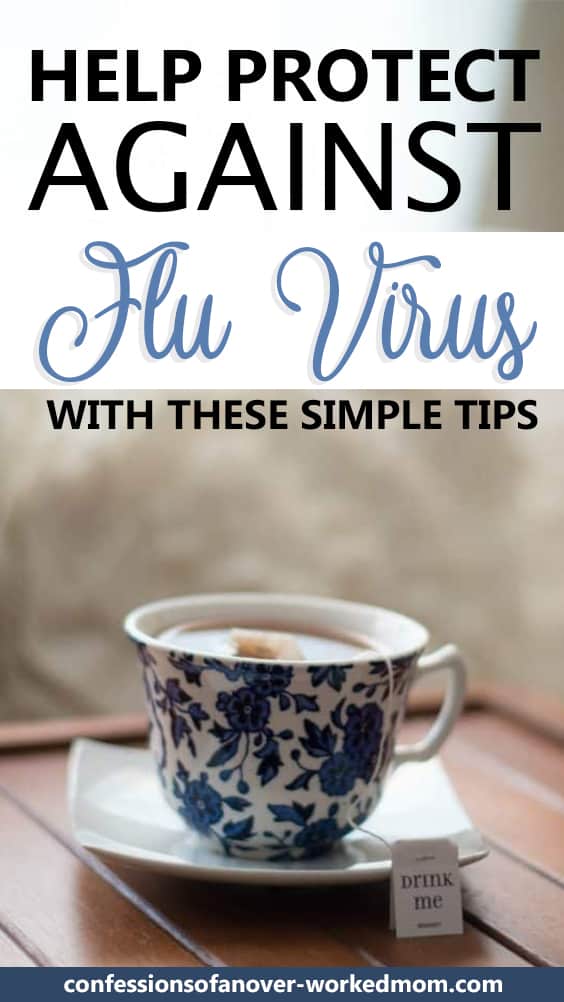Last Updated on August 14, 2020 by Ellen Christian
This post is made possible by the American Lung Association, in collaboration with Sanofi Pasteur as part of an Influencer Activation for Influence Central and all opinions expressed in my post are my own.
Posts may be sponsored. This post contains affiliate links, which means I will make a commission at no extra cost to you should you click through and make a purchase. As an Amazon Associate I earn from qualifying purchases.
If protecting against flu viruses is high on your list this year, you’ll want to keep reading for a few simple tips. My husband is disabled, so keeping him healthy each year is a priority for both of us. Because he has a reduced immune system, he’s a lot more likely to get sick than I am. And, what starts as a simple cold or flu for me, can be something serious for him.
Help Protect Against Flu Virus
So, how do you protect against flu viruses or influenza? Flu, also called influenza, is a highly contagious upper respiratory viral infection that can cause fever, muscle aches, chills, cough, and congestion. It spreads easily from person to person and can last a few days to a week in length. While it affects people differently, a case of the flu can leave you miserable and stuck in bed for days. I make sure to stock up on essentials that may help those infected cope with symptoms, such as Vitamin C, ginger, honey, and chamomile during flu season, just in case.
Flu season typically begins around October and can last through May. It’s a time when many people are more susceptible to colds and other illnesses as well. Flu season is typically seen during the fall, winter and spring months in the United States. It’s estimated that the flu has caused between 9.3 million and 49 million cases annually since 2010 — in the U.S. alone.
Can you help protect yourself from the flu?
In addition to getting a flu shot, one of the best ways that you can help protect against flu viruses and other illnesses is by keeping your immune system strong. Your immune system will help you to fight off illness and infections. You can do this by getting enough sleep, eating healthy foods, and making good lifestyle choices. Try to get outside for a walk or another type of exercise at least a few times a week.

How can you help prevent the flu in your home?
If you want to help prevent a flu outbreak in your home, it’s important to remind people to take preventive measures. Clean and disinfect surfaces that might contain germs and viruses that will make people sick. Avoid touching your eyes, nose, and mouth to prevent the spread of disease. Cover your nose and mouth with a tissue when you cough or sneeze.
Protect against flu viruses today
The flu season is not over, so it’s not too late to get vaccinated for it. While healthy living goes a long way, vaccination is still the best way to protect against the flu especially if your immune system is impaired. Being vaccinated can help prevent serious illness, hospitalization, and potentially dangerous complications from getting the flu.
Even if you aren’t worried about getting the flu yourself, consider the people you come in contact with to get vaccinated. The flu can cause serious complications for people that are disabled, have compromised immune systems, or the elderly. Since my parents are now in their seventies, the last thing I want to do is to expose them to a serious illness. Flu vaccination can also help lower the risk of stroke and pneumonia in adults ages 65 and older if you get the flu.
Take time to discuss the flu shot with your healthcare provider and see which options are right for you. To find out where vaccines are available in your area, check out the Vaccine Finder on the American Lung Association’s GetMyShot.org.
Related reading
- Help protect against the flu virus naturally
- Cold or flu? Which is which?
- Support your health during the holidays

Ellen is a busy mom of a 24-year-old son and 29-year-old daughter. She owns six blogs and is addicted to social media. She believes that it doesn’t have to be difficult to lead a healthy life. She shares simple healthy living tips to show busy women how to lead fulfilling lives. If you’d like to work together, email info@confessionsofanover-workedmom.com to chat.





